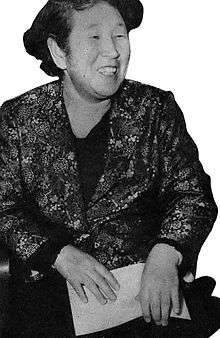Tomi Kōra

Tomi Kōra (高良 とみ Kōra Tomi, 1 July 1896 – 17 January 1993) was a Japanese psychologist, feminist, peace activist, and politician. She published under the name Tomiko Kōra (高良 とみ Kōra Tomiko).
Life and career
Kōra was born Tomi Wada[lower-alpha 1] on 1 July 1896 in Toyama Prefecture. She graduated from the Japan Women's University and then majored in psychology in the United States at Columbia University and Johns Hopkins University. In 1922 she became possibly the first Japanese woman to earn a doctorate.[lower-alpha 2] Her dissertation is titled An Experimental Study of Hunger in its Relation to Activity.[1] She returned to Japan in 1923 and taught at Kyoto Imperial University—the first female assistant professor at one of the Imperial Universities.[2]
Kōra was a member of the Japanese Christian Women's Peace Movement, and travelled to China. There in January 1932 she met the Chinese writers Lu Xun and Xu Guangping at a bookstore owned by the Japanese Kanzō Uchiyama; shortly after Lu Xun wrote a poem for her.[3]
Kōra was elected as a Councillor in the Japanese House of Councillors election for 1947 as a member of the Democratic Party. She switched to the Ryokufūkai party in 1949, and served in the House of Councillors for 12 years. In 1952, she participated in the UNESCO General Conference in Paris. She then attended the World Economic Conference in Moscow[1] that May. Per a request from the US embassy, the Japanese Foreign Ministry had refused to issue passports to those who wished to travel to the Soviet Union; Kōra and two other Councillors[lower-alpha 3] got around this restriction by travelling to Moscow through Paris, Copenhagen, and Helsinki. They met with vice-minister of the Chinese Ministry of Foreign Trade Lei Rei-min and were invited to Beijing. At the time, the Japanese government did not recognize the legitimacy of the PRC government.[4] That May she visited Beijing as a member of the House of Councillors Special Committee for the Repatriation of Overseas Japanese. The visit was a diplomatic breakthrough, resulting in the first PRC–Japan private-sector trade agreement (signed 1 June[4]) and the resumption of the repatriation of Japanese left in China following the end of World War II.[5] Both praise and opposition greeted the trade agreement from Japanese legislators.[6]
Kōra spent four days as a guest at the Women's International Zionist Organization in Israel in April 1960.[7]
Personal life
In 1929, Kōra married psychiatrist Takehisa Kōra[lower-alpha 4] (1899–1896). She gave birth in 1932 to a daughter, poet Rumiko Kōra.[lower-alpha 5] Kōra was a practising Quaker.[3]
Notes
References
- 1 2 Ōizumi 2003, p. 443.
- ↑ Kushner 2006, p. 63.
- 1 2 von Kowallis 1996, p. 185.
- 1 2 3 Shimizu 2001, p. 56.
- ↑ Itoh 2010, p. 52.
- ↑ Shimizu 2001, p. 57.
- ↑ Oron 1960, p. 304.
Works cited
- Itoh, M. (2010). Japanese War Orphans in Manchuria: Forgotten Victims of World War II. Palgrave Macmillan. ISBN 978-0-230-10636-9.
- von Kowallis, Jon Eugene (1996). The Lyrical Lu Xun: A Study of His Classical-Style Verse. University of Hawaii Press. ISBN 978-0-8248-1511-0.
- Kushner, Barak (2006). The Thought War: Japanese Imperial Propaganda. University of Hawaii Press. ISBN 978-0-8248-2920-9.
- Oron, Yitzhak, ed. (1960). Middle East Record Volume 1, 1960. The Moshe Dayan Center.
- Ōizumi, Hiroshi (2003). Nihon shinri gakusha jiten 日本心理学者事典 (in Japanese). Kuresu Shuppan. ISBN 4-87733-171-9.
- Shimizu, Sayuri (2001). Creating People of Plenty: The United States and Japan's Economic Alternatives, 1950-1960. Kent State University Press. ISBN 978-0-87338-706-4.